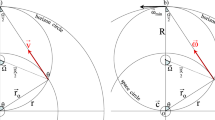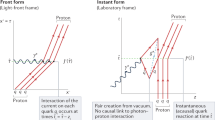Abstract
WERE a new Isaac Newton born to-day, we could send him space-travelling so as to return to us in thirty years time at, say, the age of three. This would be in accordance with the theory of relativity and with experimental tests of the theory1—and all we should get for our efforts would be a retarded child.
This is a preview of subscription content, access via your institution
Access options
Subscribe to this journal
Receive 51 print issues and online access
$199.00 per year
only $3.90 per issue
Buy this article
- Purchase on Springer Link
- Instant access to full article PDF
Prices may be subject to local taxes which are calculated during checkout
Similar content being viewed by others
References
Crawford, F. S., jun., Nature, 179, 35 (1957).
Whittaker, E. T., Phil. Mag., (7), 33, 353 (1942); Proc. Roy. Soc. Edin., 61, 160 (1942); see also Thomson, Sir George, “The Foreseeable Future” (Cambridge, 1955).
McCrea, W. H., Nature, 177, 784 (1956).
Fisher, Sir Ronald, Discovery, 18, 56 (1957).
Author information
Authors and Affiliations
Rights and permissions
About this article
Cite this article
McCREA, W. Relativistic Ageing. Nature 179, 909–910 (1957). https://doi.org/10.1038/179909a0
Issue Date:
DOI: https://doi.org/10.1038/179909a0
Comments
By submitting a comment you agree to abide by our Terms and Community Guidelines. If you find something abusive or that does not comply with our terms or guidelines please flag it as inappropriate.



